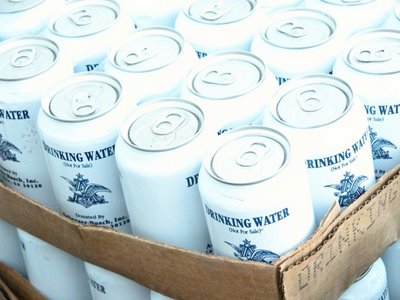
Cyclists are familiar with the sensations behind the term "bonking;" you've been riding out, have not returned, and are exhausted... but you need to ride back. You're trying, but it's really, really tough. Essentially, you're exhausted. But it's more psychological than that. You have some energy. You're just really, really tired, really, really hungry, and really, really thirsty. Those country-road inclines and head-winds are Lucifer incarnate. You think about how peaceful death must be. Car exhaust and plantlife smell delicious. You become delerious.
For me, bonking is very important. It's the best way for me to rapidly increase my endurance. In a matter of six rides, I can increase my morning / afternoon distance capacity from 30 miles to 100 miles.
Though there's no other bonking like cycling bonking-- it would not be reasonable to allow U.S. citizen workers become extremely hungry and dehydrated-- the concept still works (no pun intended). How about some philosophical analysis? All meaningful "work" results in material (physical) product / change such as mining raw materials, producing consumer goods, or rebuilding homes. Work is a measure of labor output. The quality of a worker's labor output is measured in the quantity of labor a worker issues out to the world, divided by the time over which the worker did the labor.
Labor over time => Labor Power (which most workers exchange for wages)
Workers should work to their physical / psychological limit, especially yuppies. Perhaps after six sessions of such work, volunteers will see their stamina, output, impact, and physical and psychological health increase.

I know what you're thinking, but I assure you that there are greater ironies in the world.
Okay, so if you're working, you need to drink lots of water, perhaps as many as six quarts/ liters in a day. You know someone's not working if they're not drinking a lot of water. Anyway, what about those strange canned waters? Actually, I've come to love them. I take them quite seriously, seriously enough for a comparative taste analysis.
Anheuser-Busch water comes in blue logo/text-on-white cans. Aesthetically, the can design is interesting at best, though it's not necessarily ugly. Conversely, Miller canned water comes in the sexiest cans I've ever seen-- a two-toned blue on blue. You know a company that hires Errol Morris to direct a series of television commercials has their act way together in terms of aesthetics.

Anyway, the short story is that Miller water has a bit of a shocking presence as it travels past the lips. Conversely, "Bud Water," as it is called, glides its way in, if it's chilled. Bud water, however, has a curious, very light but lingering after-taste. Miller water has none. Further, Miller water's 'shocking presence' is immediately lost as it glides down the tongue.
I have to say, Bud water is good, but Miller water is better. Many generic plastic-bottled waters taste awful. Especially Van Andel Propane company water, which boasts that it's "Award Winning!." Beer-company waters also come in 40 oz glass bottles. These are in extremely short supply, however, and I've never actually seen one.
Marco X (Utica, NY; utica@riseup.net; http://hamilton.facebook.com/photos.php?id=4501815&l=27880 )
Join the "Hands On Gulf Coast Biloxi" group on Facebook!




No comments:
Post a Comment